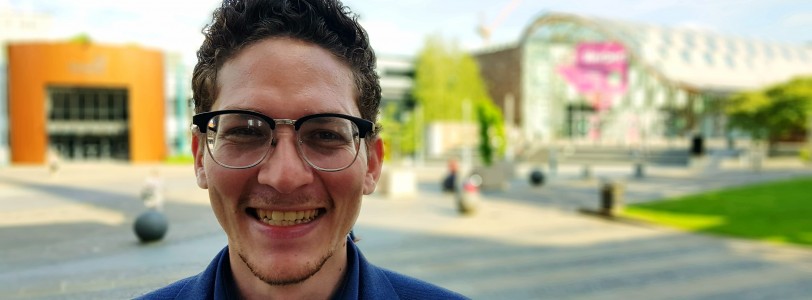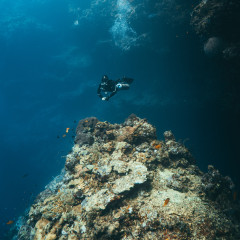Could you introduce yourself to the reader?
A 25 year-old social activist who studied Technology with Management and worked at various organizations such as UNDP. In 2018, I moved to the UK to start a new chapter in my life; I am BAZ!
While I was waiting for the positive decision from the Home Office – which took a whole year – I did not sit in the house just staring at the walls, but I started my activism by volunteering again and also took some training courses. Asylum seekers are not allowed to contribute financially to society, and unfortunately there are many restrictions on them!
Other colleagues and I set up a group of people under the umbrella of City of Sanctuary trying to get organizations together and helping other asylum seekers in the city. After a few months of establishing the group, we were awarded the Refugee Week Advocacy 2019 Award.
Nowadays, having been granted asylum, I work as a fundraising assistant and look forward to studying soon. Last but not least, I have not given up my volunteerism so I DO volunteer beside my work.
What is Refugee Week?
Refugee Week (Refugee Festival Scotland in Scotland) is a nationwide annual celebration of the diversity the UK has. This particular celebration sheds the light on refugees and asylum seekers, but is open for all to attend and enjoy the variety of activities which are brought, and performed, from around the globe by refugees and asylum seekers. These traditional cultural performances include arts and paintings, plays, singing and dancing.
It is a celebration in which NO boundaries are set between people. Black or white, male or female, young or old; all nations come together to CULTIVATE, ENJOY and CELEBRATE…
It looks to cultivate and educate people about the journey a refugee or asylum seeker has been through, and to let them ‘walk only one mile in our shoes’.
Enjoy the vibrant shows. Celebrate the diversity.
How did you first hear about Refugee Week?
As far as I remember, I heard through the organization I was volunteering with while I was waiting for the Home Office’s decision.
And why did you want to become a Refugee Leader?
I wanted to give a hand to others, and teach something as well as learn many things. Also, I wanted to try and change the perspective that some people have about us. Last but not least, I wanted to advocate on behalf of the people who have no voice, and no ears to listen to them.
What does that work entail?
Conducting campaigns which includes advocating, meeting MPs and people in power. It also requires a dedication and passion for helping others and not waiting for a reward. There also needs to be an ability to debate, and have an open mind and empathy for other people.
Why do you think youth leadership is important?
This question is significant and needs research to answer fully, but here are the most important points:
- It opens new paths for more understanding between young people, who arethe next generation
- The main pillar in developing a community is giving youth a place to take part in decision-making, where they can apply what they have learnt throughout their lives as well as gain new skills.
- Considering that they will be leading the country next, we should ensure that they are well-qualified to do so and the best way to assure that is involving them more.
- When it comes to analysing issues facing a community, decision-makers will have a better knowledge when they consult youth as they have deep experience in modern life and what a society really needs.
- By giving youth the opportunity to lead, they will feel part of the community. Imagine leaving youth without that – they will try to find other things to fill their time, which sometimes can include illegality. Also, by including them now, they won’t just take but they will give back to the next generation.
To sum this up, youth leadership affects the whole community, the present and future!
Do you think the UK is doing enough to help refugees?
In some areas it is doing enough, but for sure there is always a space for improvement and doing more.
One of the main principles the UK should do, in my opinion, is set up a governmental body superseding NGOs work, as many of them are mainly just employing themselves at the minute.
What practical things can someone do to help support refugees and asylum seekers?
Well, it varies from one county to another, or indeed even one city to the next. In general, understanding is really helpful. By that, I mean understanding the circumstances that people have gone through, understanding that we are NOT here to ‘steal’ jobs, and understanding that we came from different countries and cultures, so if we did something we may think it is ok to do but here it’s not. It will cause no harm to speak with us, educate us about your culture and in return we will educate you about ours.
That leads me to the next point, which is related to what I mentioned above, and that is integration. By that, I do not mean one-day trips, but considering refugees and asylum seekers as part of the community.
Opening new opportunities would really be appreciated. Let us live among you and with you. We came with qualifications and skills why do not we – refugees, asylum seekers and British themselves – utilise them. Don’t put restrictions on us, and allow us make OUR society better.
Working with Counterpoints Arts, how do you think art helps to bring cultures together?
Counterpoints Arts understood a very important part of refugees and asylum seekers life, which is art, and they knew that this is common with all nations, and has been bringing them together since ancient ages.
Art is blind to the discrimination we have been inventing; people with similar interests will sit together to create something. It is a mosaic, each person fits in his/her place then together we create the whole piece of art. The most simple evidence I can give is to have a look at galleries – people from various nationalities go to them to learn and enjoy without asking what the artist’s colour is!
Art is not just about a painting or a performance, but is also about making friends, learning a language, integrating, and more than that, it even helps overcoming mental health issues.
The hub for all of them is Counterpoints Arts, where they will be encouraged and provided with all the facilities needed. It does not only provide art-related support but also training related to media, leadership and many more.
What does identity mean to you?
Do you mean self-identity, national identity or other ones? Presumably, self-identity.
It is hard to define such an ambiguous word because identity includes all the things that have shaped a person’s personality; what they have been and what they will be. It is skills, culture, ways of thinking. The ‘things’ even extend to include the society as well as the city itself as they are affected and have been affected.
It is the behaviours, beliefs, principles and values which a person follows. Identity is very exclusive to each person so we cannot find two people who have the same one – but they might have things in common!
What do you do outside of your work on Refugee Leaders work?
I work as a fundraising assistant and as a volunteer at two organizations including leading a project to help refugees and asylum seekers knowing more about campaigning and advocacy.
Where can people find out more about what you do?
If you have anything to discuss, please do not hesitate to contact me via Refugee Week.
You can find out more and sign up to the Refugee Week newsletter at www.refugeeweek.org.uk.
Editor's note: This article was updated 8 March 2021 to change the interviewee's name.









0 Comments